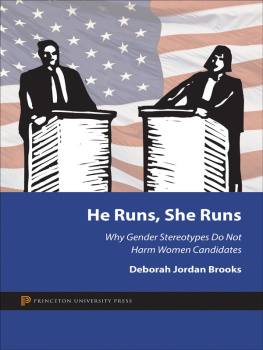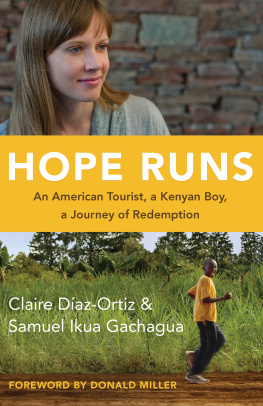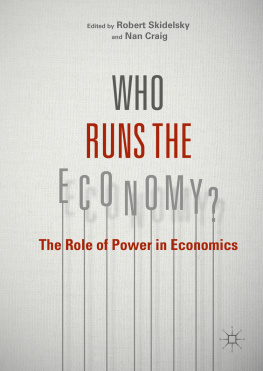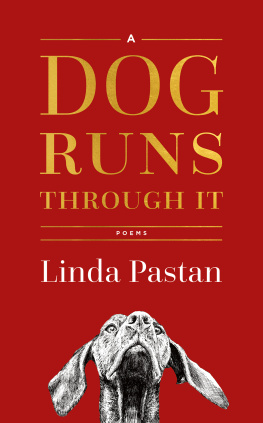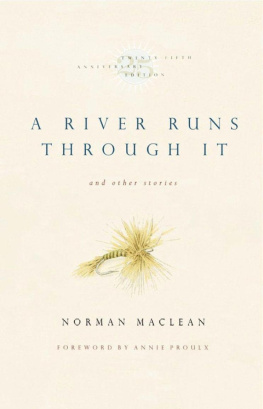Copyright 2013 by Princeton University Press Published by Princeton University Press, 41 William Street, Princeton, New Jersey 08540
In the United Kingdom: Princeton University Press, 6 Oxford Street, Woodstock, Oxfordshire OX20 1TW
press.princeton.edu
All Rights Reserved
Library of Congress Cataloging-in-Publication Data Brooks, Deborah Jordan.
He runs, she runs : why gender stereotypes do not harm women candidates / Deborah Jordan Brooks.
pages cm
Includes bibliographical references and index.
ISBN 978-0-691-15341-4 (hardcover : alk. paper) ISBN 978-0-691-15342-1 (pbk. : alk. paper) 1. WomenPolitical activityUnited States. 2. Women political candidatesUnited States. 3. Political campaignsUnited States. I. Title.
HQ1236.5.U6B77 2013
320.082dc23
2012045252
British Library Cataloging-in-Publication Data is available
This book has been composed in Sabon LT Std
Printed on acid-free paper
Printed in the United States of America
1 3 5 7 9 10 8 6 4 2
ACKNOWLEDGMENTS
An incredible group of people helped to make this book possible, and I am enormously grateful to all of them for their help. Very special thanks are due to Joe Bafumi, Jamie Druckman, Kim Fridkin, John Geer, Marc Hetherington, Mike Mastanduno, Chuck Myers, and Ben Valentino for their tremendous assistance at multiple stages of this project. Their support made this a much stronger book. I also owe many thanks to a wide range of people who provided feedback and assistance on specific pieces of this project. I appreciate the help of Lisa Baldez, Barbara Burrell, Alice Eagly, Linda Fowler, Danny Hayes, John Hibbing, Jen Lawless, Alan Gerber, Matt Green, Leonie Huddy, Richard Isomaki, Beth Jafari, Dean Lacy, Celinda Lake, Rick Matland, David Mayhew, Rose McDermott, Diana Mutz, Zoe Oxley, Deborah Prentice, Kira Sanbonmatsu, Brent Stranthman, Debbie Tegarden, Beth Theiss-Morse, and Dan Wirls at critical points during the process of writing this book. Additionally, I would like to thank all of the participants at the New Research on Gender and Political Psychology conference held at the Institute for Womens Leadership at the Eagleton Institute at Rutgers University in the spring of 2011 for extremely useful feedback on this project, along with the coordinators of the conference (Monica Schneider and Angie Bos) for organizing such a fantastic event.
This project most certainly would not have been possible without the creativity and dedication of Sam Luks and Ashley Grosse at YouGov (formerly named Polimetrix), along with the rest of their team of survey professionals who make it possible to undertake online survey work like this. I could not be more impressed by their ability to turn my research designs, no matter how complex, into rich, high-quality public opinion data. I deeply appreciate their partnership on this and so many of my projects.
Several research assistants deserve special recognition for their commitment to this book project. The book was not only improved because of their efforts, but working with such a truly great team of energetic and sharp Dartmouth undergraduates made the entire process more enjoyable along the way. Tremendous thanks are due to Michelle Chan, Katie Gonzalez, Julia Greenberg, Franziska Hertel, Hannah Katterman, and Despina Sideri for extended involvement with this project. I also greatly appreciate the assistance of Natalie Colinari, Ana Haggerty, Fermin Liu Ku, Sam Marullo, Jenna Pfeffer, Caitlin Veator, and Amanda Wheelock at particular stages of this project.
This project would not have been possible without research funding from Dartmouth College. I am very grateful for that support, and to the deans at Dartmouth College for making it available to me. And every day, I appreciate Chris Gex and Gina Sekula for providing administrative support that allows me and all of the professors in the Government Department at Dartmouth to be productive on research.
While my former colleagues at the Gallup Organization did not directly assist on this book, the learning I received there about polling and managing complex research projects very much radiates throughout this book, as it has through all of my work. Many thanks to Jeff Jones, David Moore, Gale Muller, Frank Newport, and Lydia Saad, in particular, for the learning they provided to me during my half decade working there. In a similar manner, the early and continued mentorship of Alan Gerber, David Mayhew, and Dan Wirls permeates my work in countless ways.
Finally, I would like to deeply thank my best friend, favorite colleague, and husband, Steve Brooks, for being there at every step of this project. And I would like to thank my two daughters, Riley (currently nine years old) and Avery (currently six years old), for being amazing little future women who inspire me every day; this book is dedicated to them.
HE RUNS, SHE RUNS
CHAPTER 1
Introduction
Im no lady; Im a member of Congress, and I shall proceed accordingly.
MARY THERESA NORTON, U.S. HOUSE MEMBER FROM 19251951
When Hillary Clinton ran in the 2008 Democratic presidential primaries, she seemed to have trouble connecting effectively with the public. After months of a campaign that emphasized her toughness and experience, she underperformed in the polls relative to her biggest competitors. While some observers argued that her strong emphasis on experience caused voters to think she was trying too hard to be the smartest girl in the room, others maintained that the focus she had adopted was dictated by the politics of gender: although a male candidate like Barack Obama could be seen as credible without much past experience, a woman candidate would not be.
When Clintons campaign then sought to soften her image through more intimate gatherings, more compassion-oriented discussions, and more personally emotive moments to increase her likeability, that approach seemed to backfire as well. Her campaign started a Web site TheHillaryIKnow.com
While Clinton attracted a devoted set of core supporters, she also had high unfavorable ratings. With conflicting advice ricocheting from pundits and consultants about how to present herself, she tried a variety of different approaches for connecting with primary voters. In the end, of course, more Democrats voted for Barack Obama, and she lost the Democratic nomination for president.
Hillarys loss was not the last chance for a woman to appear on a national ticket in 2008. When Sarah Palin was announced as the vice presidential candidate on the McCain ticket for the general election, commentators zeroed in on her low levels of previous experience. Knowledge gaffes in her infamous Charles Gibson and Katie Couric interviews did not help Palins case on the credentials front, and some argued that the scrutiny of her experience was exacerbated because she was a woman.

